Latest
Niger Delta oil pipeline attacks: Manifest of likely suspects
Published
10 years agoon
By
Olu Emmanuel
HOW else can anybody describe the public pronouncements including outright threats by federal government officials particularly the military on the unfortunate incidents of recent attacks on oil facilities particularly crude oil trunklines in Delta and Rivers states if not to say that so far, they have been very narrow-minded at best and at worst outrightly naive.
Naturally as expected, the federal government was quick to accuse Tompolo and and/or militants loyal to him as being responsible for the attacks but from all indications, this was an easy judgement of a very complex matter.
Let us even look at the case: A statement from the spokesperson of the Nigerian National Petroleum Corporation (NNPC), Ohi Alegbe had it that The Bonny – Okrika crude supply line to the Port Harcourt Refinery and the Escravos-Warri crude supply line to the Kaduna Refinery were simultaneously breached on the night of Saturday 16th January2016.
Agreed it was convenient for the federal government to blame Tompolo and/or militants loyal to him for the attack on the Escravos-Warri trunkline because it falls within the area where they have been misbehaving over the years. So they may want to use such deviant actions to register their displeasure over what they may have perceived as unfair handling of the case of alleged fraud against Tompolo on the botched Maritime University land deal.
Now, if this is so, the question then is: was it Tompolo and/or militants loyal to him that also went on the same day to Rivers state to destroy the Bonny-Okrika line that supplies crude to the Port Harcourt Refinery?
If the answer is yes, then the operators of Operation Polo Shield, the joint military taskforce in the Niger Delta should be held responsible for the breaches as it depicted a woeful failure not only of intelligence but in actual field operation. From Delta to Rivers states through Bayelsa, we have JTF checkpoints scattered all over the place some even as close as one-two kilometres apart both on land and on the waterways. So the JTF cannot completely extricate itself of culpability by negligence of assigned duty in this.
Except the government is saying that Tompolo has foot soldiers both in Delta and Rivers states which he can use simultaneously to strike on targets in these areas. And if this be, then the problem is bigger than what we are actually seeing on the surface. This is the truth!
So it is clear that there is something glaringly wrong with the hasty conclusion and public pronouncements of government officials particularly the military on the refineries crude supplies pipelines attacks.
And curiously so, the incident in Port Harcourt has been deliberately played down while so much heat and threats of fire and brimstones have been raining over the Delta incident.
It was surprising that the Commander of the Joint Task Force, JTF, Major-General Alani Okunola, during his visit to sites of bombed pipelines on January 17, 2016, could openly threaten that community leaders would be held responsible for attacks on oil facilities by miscreants. The question is: between rural Niger Delta community leaders and his JTF men paid to protect oil facilities in the Niger Delta, who should actually be liable for the attacks?
And as expected, the spokesperson of Ijaw Youth Congress (IYC), Eric Omare, in a statement, Thursday 21stJanuary outrightly disagreed with the JTF commander’s stance saying: “We fault the threat by the JTF to hold community leaders responsible for attacks on oil facilities and wish to alert the world of the impending attack on innocent Ijaw communities and people by the military under the guise of looking for suspected bombers of oil facilities.”
This renewed attack on supply lines from all indications may go far beyond Tompolo or any militant group that wants to protect their interests or interests of their leaders. There is every attribute of deliberate sabotage of the nation’s effort to boost domestic production of petroleum products by setting out to cripple the refineries that are just being woken from dormancy.
If the militants as alleged, wanted to sabotage the Nigerian economic by breaching government’s revenue earning channels, is it the trunklines supplying crude to refineries they would be targeting? If they have destroyed trunklines supplying the export terminals in Delta and Rivers wouldn’t that produce more devastating impact on the nation’s oil revenues?
In as much as this is not to exonerate the miscreants who parade as militants in the Niger Delta from carrying out such dastardly acts, we should rather broaden our scope in search of who the real culprits in these renewed attacks could be.
If our refineries come back to optimal operational levels, is that not going to drastically reduce the volume of products we bring from offshore to bridge our domestic needs? More so, the vice president, Yemi Osibanjo has been telling whoever wants to hear at any opportunity he has to represent the president within and outside this country, that removal of subsidy would save over N985 billion annually for the federal government. Are we going to be talking of removal of subsidy when we cannot produce a meaningful fraction of what we consume domestically? So let’s be wise so we can actually begin to see who the real enemies of this country are.
Let’s not even go to the issue of whether the Port Harcourt and the Kaduna Plants were actually onstream and producing the trickles as claimed by the NNPC in the first instance. Was it not on November/December last year that the NNPC came up with the excuse of Kaduna refinery not coming onstream as originally scheduled. What was their reason: that the day the refinery was to start production, the NNPC discovered over 78 breaches between Warri and Lokoja on the crude oil supply trunkline. The question is: have these damged pipes been repaired; when were they repaired and by which contractor (s)?
You can’t use one lie to cover another lie and this is the problem we are having now. So if Kaduna refinery has been working to produce petrol and diesel, where has the crude feedstock been coming from- is it through the supply line that had over 78 breaches between Warri and Lokoja alone? Nigeria we hail thee!
Is it not surprising that barely 24 hours from the attacks, The NNPC announced (Sunday), it had carried out an operational shut down of two of its three refineries- Port Harcourt and Kaduna due to crude supply problems as a result of the pipeline attacks.
As said in statement by the spokesperson of the, Ohi Alegbe, “The plants were shut simultaneously on Sunday after the Bonny – Okrika crude supply line to the Port Harcourt refinery and the Escravos-Warri crude supply line to the Kaduna refinery suffered breaches.
The statement reads: “Prior to the closure, the Port Harcourt Refinery was recording a daily PMS yield of over 4.1 million litres while Kaduna was posting about 1.3 million litres.”
Also as reported, the Power ministry was quoted Tuesday 19th January 2016 as bemoaning the costs in terms of multiple losses suffered in massive disruption to gas and electricity supplies in the wake of the attacks on the Nigerian Gas Company’s gas pipeline by whoever. Is this not a criptive warning that Nigerians should not even think of expecting steady improvement in electricity supply in both the short and medium terms.
As we have already been told by the power ministry, “The attack on the Escravos -Lagos Pipeline System (ELPS) connected to Chevron Nigeria Limited’s gas network at Escravos negatively impacted on the 600 mega watts (MW) Olorunsogo National Integrated Power Plant and other critical power projects in the region.
“The immediate impact of the sabotage on the gas facility, Federal Ministry of Power sources said, has been the disruption in the sale and supply of 160 million metres standard cubic feet per day (MMSCD) of gas to operators of electricity generation facilities and a cut in electricity supply from the affected power plants.
“Government computation on the extent of loss showed that at about cost $2.50 per thousand standard cubic feet of gas, the country was suffering an estimated $400,000 (about N78.8 million) loss daily through the inability to meet its gas supply obligations to its customers.
“The loss does not include about $1,988,223 (about N391.7 million) lost daily by operators of the affected power generation plants for not supplying electricity to their customers.
“When the estimated cost of about $609,137 (about N120 million) for the repairs of the damaged pipeline is added, the Nigerian government and the people would have suffered a daily loss of about N590.5 million to the incident.
Is it not foolish to let somebody, if at all it’s a miscreant, who has vowed to inconvenience you to know on the same day of his action that what he did actually created intractable problem for you?
Walahi, the widely trumpeted alarms of the consequences of the destruction of the oil pipelines in Delta state looks as a deliberate effort and part of the conspiracy to set the government on panic mode to jettison some of the well-intentioned policies it wants to implement. This may be a wrong line of thinking but supposing there are some truths in it? God bless Nigeria!
You may like
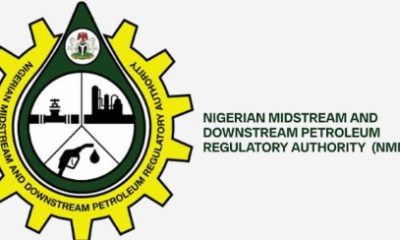

NMDPRA – Nigerians spend N1.3tn on petrol in June amid soaring energy costs
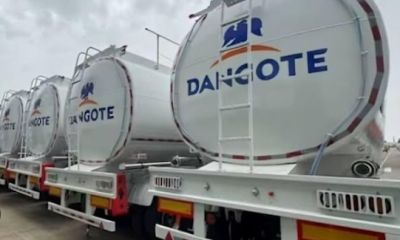

NOGASA urges government intervention as Dangote refinery’s direct supply plan sparks industry fears
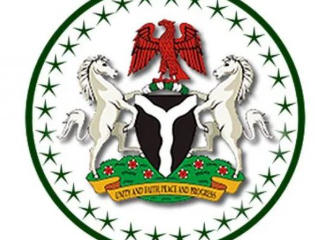

FG defends borrowing plan, claims 10 states involved
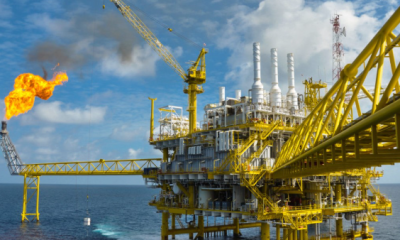

Nigeria sheds Top importer status as Dangote refinery transforms Africa’s fuel market
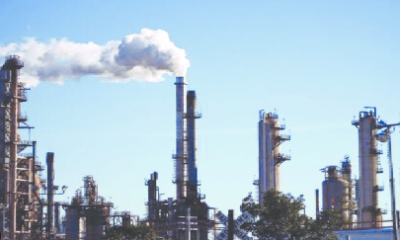

Kaduna women protest alleged KRPC chemical pollution, Demand action


NNPC Foundation donates 25,000 STEM textbooks and mini libraries to 25 secondary schools
Trending

 Entertainment6 days ago
Entertainment6 days agoSimi addresses resurfaced 2012 tweets amid online backlash

 Health1 week ago
Health1 week agoSCFN, LUTH introduce bone marrow transplants as curative treatment for sickle cell

 Health4 days ago
Health4 days agoDeclassified CIA memo explored concealing mind-control drugs in vaccines

 Football1 week ago
Football1 week agoHarry Kane nets brace as Bayern edge Frankfurt 3–2 to go nine points clear

 Football1 week ago
Football1 week agoLate Flemming header stuns Chelsea as Burnley snatch 1–1 draw at Stamford Bridge

 Crime5 days ago
Crime5 days agoSenior police officers faces retirement after Disu’s appointment as acting IGP

 Education6 days ago
Education6 days agoPeter Obi urges JAMB to address registration challenges ahead of exams

 Health6 days ago
Health6 days agoNAFDAC issues alert on suspected revalidated SMA Gold infant formula

